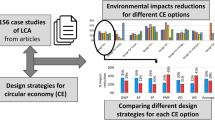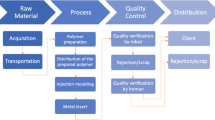Abstract
Consumers are increasingly accepting of items based on a sustainable design or project; as a result, corporations should consider these several characteristics while developing new products.
In this work we intend to analyse the environmental impact of the production and manufacturing from the conception and design stage, up to the disassembly of the products, using software and simulation routines dedicated to the assessment of the environmental impact of the materials, production, distribution and end-of-life strategies using the SOLIDWORKS Sustainability.
The work is divided into several parts: definition of sustainability in the development of products; legal proceeding; environmental impact analysis studies throughout the life cycle assessment (LCA) of a product; case study of a plastic cup. The environmental impact of materials will be studied from the stage of obtaining raw materials, through transport, production, use and disposal (or restart as a new product) supported by the concept of circular economy.
Finally, simulations of production process variables will be carried out to minimize the environmental impact, reduce waste and energy, which will have multiple beneficial implications for the industry.
Access this chapter
Tax calculation will be finalised at checkout
Purchases are for personal use only
Similar content being viewed by others
References
Ellen MacArthur Foundation: What is a circular economy? https://ellenmacarthurfoundation.org/topics/circular-economy-introduction/. Accessed 13 Nov 2021
NielsenIQ Group: Report Sustainable Shoppers. https://nielseniq.com/global/en/insights/. Accessed 3 Jan 2022
Simon, D.: Our common future: report of the world commission on environment and development (book review). Third World Plann. Rev. 9(3), 285 (1987)
Purvis, B., Mao, Y., Robinson, D., Three pillars of sustainability: in search of conceptual origins (2019)
Pensar Group: Afterlife: A Guide to Design for Disassembly. https://pensar.com/design-for-disassembly/. Accessed 10 Dec 2021
Environment and Climate Change Canada. https://www.canada.ca/en/environment-climate-change/services/managing-reducing-waste/.html. Accessed 04 Jan 2022
Ideiacirculat/Cradle to Cradle - C2C. https://www.ideiacircular.com/o-que-e-cradle-to-cradle/. Accessed 04 Jan 2022
Cooper, J.S., Fava, J.: Life cycle assessment practitioner survey: summary of results. J. Industr. Ecol. (2006)
Lewis, H., Gertsakis, J., Grant, T., Morelli, N., Sweatman, A.: Design + Environment: A Global Guide to Designing Greener Goods, Greenleaf Publications (2001)
Fantossi, F., Bartocci P.: Carbon Footprint as a Tool to Limit Greenhouse Gas Emissions; Chapter book Greenhouse Gases/Project: Life Cycle Assessment (2016). https://doi.org/10.5772/62281
Ma, F., Wang, W., Sun, Q., Liu, F., Li, X.: Ecological pressure of carbon footprint in passenger transport: spatio-temporal changes and regional disparities. Sustainability 10, 317 (2018). https://doi.org/10.3390/su10020317
Materials science – Wikipedia. https://en.wikipedia.org/wiki/Materials_science#Emerging_technologies. Accessed 25 Nov 2021
Pradhan, S., Rajamani, S., Agrawal, G., Dash, M., Samal, S.: 7 - NMR, FT-IR and Raman Characterization of Biomaterials, Chapter book, pp. 147–173 (2017). https://doi.org/10.1016/B978-0-08-100737-2.00007-8
Author information
Authors and Affiliations
Corresponding author
Editor information
Editors and Affiliations
Rights and permissions
Copyright information
© 2023 The Author(s), under exclusive license to Springer Nature Switzerland AG
About this paper
Cite this paper
Honório, J., Simões, A., Galvão, M., Neves, F., Galvão, J. (2023). Design Sustainable Products in a Circular Economy Context. In: Duque de Brito, P.S., et al. Proceedings of the 2nd International Conference on Water Energy Food and Sustainability (ICoWEFS 2022). ICoWEFS 2022. Springer, Cham. https://doi.org/10.1007/978-3-031-26849-6_19
Download citation
DOI: https://doi.org/10.1007/978-3-031-26849-6_19
Published:
Publisher Name: Springer, Cham
Print ISBN: 978-3-031-26848-9
Online ISBN: 978-3-031-26849-6
eBook Packages: Earth and Environmental ScienceEarth and Environmental Science (R0)




